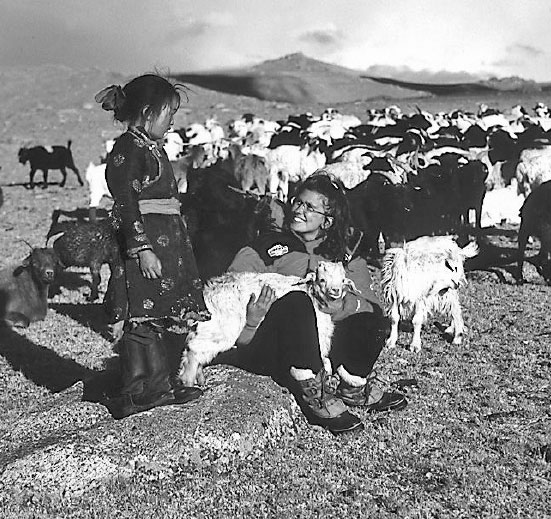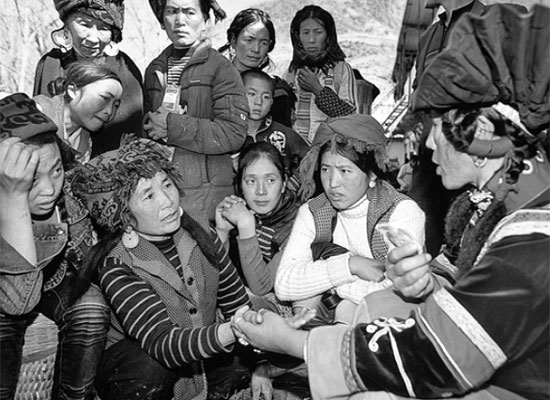Open lens
Updated: 2014-10-17 07:19
By Mike Peters(China Daily USA)
|
|||||||||
While trailing the migration of nomads from Central Asia, photographer Livia Monami lands in China's Guizhou province to find its multiethnic culture sweeping her. Mike Peters reports. Mike Peters reports.
Her camera has captured villagers who live the centuries-old lifestyle of hunter-gatherers in the shadow of modern banks, traditional opera scenes in which ancestral ghosts appear as human figures that dispel evil and bring auspicious influence, and Shamans telling fortunes in a muddy Guizhou street.
Livia Monami, 50, wasn't supposed to be a photographer or wander through rural Southwest China, embracing the traditions of Guizhou's residents, as she recently did for six weeks.
|
Above and below: Photojournalist Livia Monami made friends all over Guizhou province. Provided to China Daily |
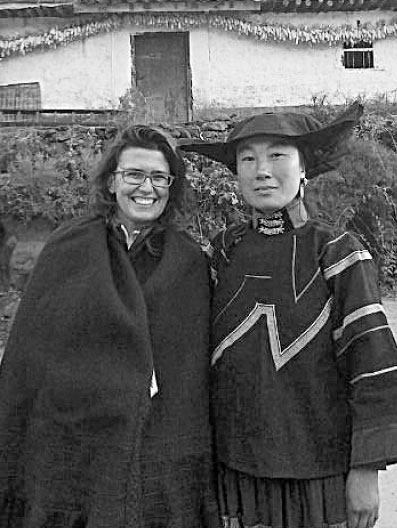
|
Yi women consult a local female shaman in Meigu county, Guizhou province. Livia Monami / Provided to China Daily |
"I was in university to study biology - dolphins, whales, Jacques Cousteau, all that," says the Italian freelance photojournalist. Toward the end of her studies, she organized a two-week "vacation" to work with Brazilian researchers who were studying freshwater dolphins in the Amazonia region.
But it was the indigenous Pataxo Indians in the Bahia area, and the "vast empty spaces with people living in their old ways" that really stuck with her, she recalls. "I was there only 15 days but I knew my direction."
That direction impelled her to places far from the modern hustle and bustle, to communities where life has changed little over centuries, staying attuned to nature.
A return trip to Amazonia taught her to shape that quest for common human values into a livelihood.
"I went and found the richest person in Manaus," she says, laughing. Manaus is the Amazon's largest city. Her intensity convinced him to sponsor her documentary work. "He gave me a boat and a crew, and arranged for a military helicopter for two hours of aerial photography and video."
That experience taught her how to write, present and sell a project to sponsors, who today are sometimes governments.
She can trade her images for access and logistical help in places like Siberia, where many areas are off-limits to the public because of security issues.
At the end of the last glaciation, 10,000 years ago, as the ice slowly melted, nomadic people from Central Asia moved north, following their migrating animals to Siberia and into North America. Exploring the story of that migration, she spent months with the Inuit in Canada, the nomads in Mongolia, and with the Dolgan reindeer breeders in Siberia.
The research brought her to China, where she was fascinated by the cultures of Guizhou province, one of China's poorest regions. There she found a harmonious family of communities, representing 49 of the country's 56 ethnic groups.
Other than exciting individuality, their faces gave her hints of bone structures and other traits that she'd observed in remote areas from Mongolia to Canada.
"I didn't do too much research before I went to Guizhou," she says via Skype from her home in Rome. "I wanted to meet people and discover for myself the intricacies of the cultures."
A common trait she admired in China was the value placed on collaboration - "so different from the European individualism".
In Bandi village she was taken by the legacy of the "black Yi" (noble class) and the "white Yi" (commoners who worked for aristocrats ages ago).
"Today the people are very mixed, you can't see which type they are by looking at their faces," she says. "The Yi are very proud people with a strong sense of themselves."
In Nanlong, 30 kilometers south of Xingyi, she met the Bouyei people. She savored the fact that their ethnic clothes were for everyday use, not a tourist show; the way women dyed wool and cotton cloth with vegetable pigments and wine; the way they made their special embroidery; the way villagers in areas susceptible to droughts gathered rainwater to wash their hair; the way old banyan trees were celebrated for their fantastical, animal-like shapes; the way music was always part of life and the way houses were built on fengshui rules.
She learned about the "eight sounds" music style, enriched with traditional stringed instruments and flutes, and after performing with her own flute, Monami surprised her hosts by presenting it to them.
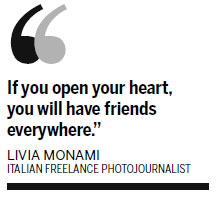
She was amazed by the Yi shamans in the village streets of mountainous Meigu county.
"In Siberia, and in the movies, you have to travel a long way through the wilderness to find shamans," she says. "There, shamans were everywhere, and people were lined up to pay a small amount of money for fortune-telling."
The most moving moment, perhaps, was when a group of women asked Monami to photograph them - for their grave sites.
She met "nice Soga women" in Longga, who binded her hair to a wooden horn with hemp fiber and dyed black woolen yarn, in their traditional hairstyle.
Journalists tend to document murder, disaster and general bad news, she says, but her mission is to find the positive side of the human story, which she chronicles on her website Liviamonami.com.
She also shares her experiences with students aged between 6 and 14.
"Kids come excited to see people from faraway places," she says of her photographs, "but they become sensitive to other cultures when they see, behind the differences, that these are really people like themselves."
Monami was particularly charmed by one of her last stops in Guizhou, where her driver - who was given up for adoption as a child - asked if she would be willing to stop by the village where he was born. She agreed, and was overwhelmed to be greeted by adults bearing flowers and children carrying small gifts there.
"I never saw anything like it in my life - even in Italy, where family is so important," she says. Monami is keen to return to China in November - she'll split her time between Chengdu and the Wudang mountains, where she will study martial arts.
"If you open your heart," she says, "you will have friends everywhere".
Contact the writer at michaelpeters@chinadaily.com.cn
(China Daily USA 10/17/2014 page15)
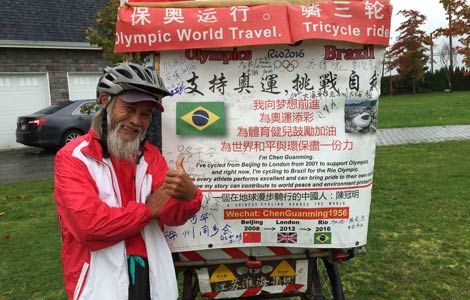
 Riding the Olympic Rickshaw in Vancouver
Riding the Olympic Rickshaw in Vancouver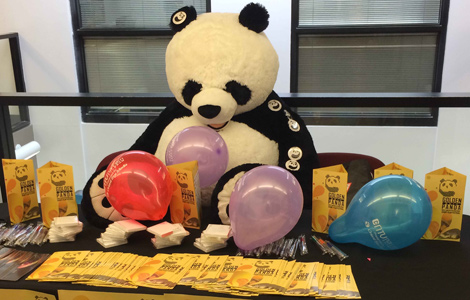
 Film festival connects Chinese, American filmmakers
Film festival connects Chinese, American filmmakers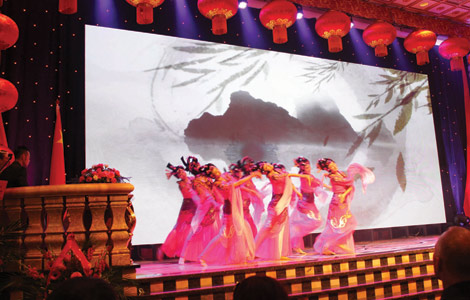
 Across Canada Oct 17
Across Canada Oct 17
 Premier Li attends the Fifth Italy-China Innovation Forum
Premier Li attends the Fifth Italy-China Innovation Forum
 WWII photos evoke lasting bond
WWII photos evoke lasting bond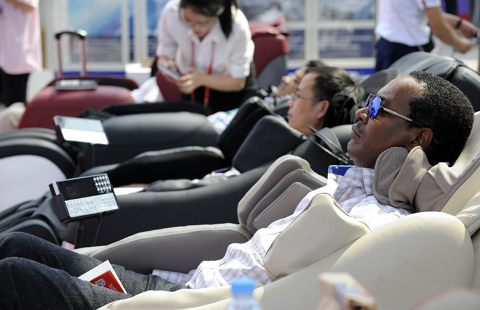
 116th China Import and Export Fair kicks off in Guangzhou
116th China Import and Export Fair kicks off in Guangzhou
 Movie 'Hollywood Adventure' begins filming in US
Movie 'Hollywood Adventure' begins filming in US
 Mindboggling ways to bring the bride home
Mindboggling ways to bring the bride home
Most Viewed
Editor's Picks

|

|

|

|

|

|
Today's Top News
China-US summit will echo Sunnylands meeting
Analysts still bullish on Alibaba one month after IPO
Ambassador optimistic on China-Canada relations
The tenth Asia-Europe meeting opens in Milan
Patient with 'Ebola-like symptoms' admitted to Conn. hospital
Premier Li sows the seeds for farming
Short-film festival connects Chinese, North American filmmakers
US Ebola patient allowed aboard flight
US Weekly

|

|
